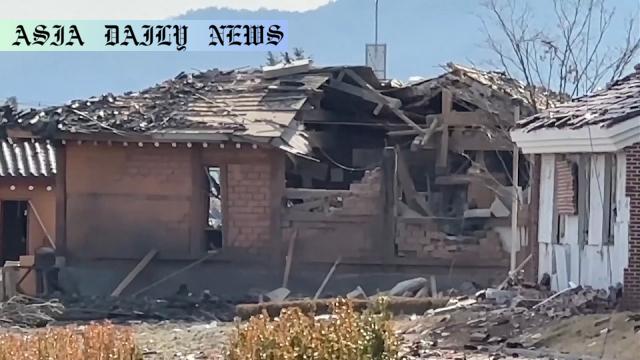Fighter jets mistakenly dropped eight bombs during drills in Pocheon, injuring seven people and causing property damage.

South Korean Fighter Jets Cause Unintended Destruction During Drills
In an unexpected and unfortunate turn of events during a routine training drill, South Korean KF-16 fighter jets mistakenly dropped eight bombs outside the designated training area. The incident, which took place in Pocheon, located in Gyeonggi province, left seven individuals injured, two of whom are currently in critical condition. Casualties aside, the accident resulted in significant property damage involving the destruction of churches, homes, and vehicles. Public concern has risen sharply as visuals aired by South Korea’s public broadcaster, KBS, show broken windows and demolished walls across affected areas, highlighting the destructive intensity of the MK-82 bombs used during the exercise.
The live-fire exercise, a collaboration between South Korean and U.S. forces, was designed to simulate combat scenarios, with an emphasis on coordinated strategic execution. KF-16 fighter jets’ mistaken bombings have placed a spotlight on the risks associated with such drills, especially when carried out near civilian areas. The MK-82 bombs—sophisticated munitions commonly deployed for structural demolition—released during the exercise underscore the potential dangers posed by powerful military equipment outside controlled environments. As reports of such incidents accumulate globally, the military faces growing scrutiny over safety protocols, procedural lapses, and on-ground impact on civilian areas.
An Official Response and Public Outcry
The South Korean Air Force swiftly issued an apology following the incident and voiced its concern for the victims, expressing hopes for their speedy recovery. They also pledged an immediate investigation into the sequence of events that led to this regrettable occurrence. While the gesture comes across as sincere, public criticism remains strong, particularly concerning the choice of using live ammunition in close proximity to populated areas. Critics argue that despite the necessity of combat readiness, ethical responsibility in protecting civilian lives and infrastructure must be upheld diligently.
Efforts to provide reparations and assurance of reform are underway, as residents demand comprehensive explanations for what went wrong. Coupled with public outcry, this incident poses challenges for bilateral military cooperation exercises. Pocheon residents are particularly demanding tighter regulations and preemptive safety checks to eliminate risks threatening their daily lives.
The Broader Impacts of Military Exercises on Civilians
This tragic incident not only emphasizes dangers during live-fire drills but also speaks volumes about the cost associated with large-scale military coordination. As joint operations between countries become increasingly common, nations must balance military preparedness and ethical considerations. Incidents such as this demand decisive, transparent action from authorities and bring into question the futures of similar cooperative drills. The assurance of safety is pivotal, no matter how advanced or streamlined military programs claim to be.
As South Korea and its allies push for greater strategic defense readiness, it is essential to incorporate lessons learned from such mishaps to avoid recurrence. From protocol reinforcements to better system checks during training drills, authorities must ensure that human errors causing catastrophic ripple effects can be minimized. In light of this, the dialogue expands further to address the global measures safeguarding human lives during military innovation.
Commentary
Examining the Risks and Responsibilities of Military Drills
Military drills, though integral to maintaining national and global security, often reveal the vulnerabilities associated with high-stake operations. The recent unintended bombing incident involving South Korean KF-16 fighter jets exemplifies the challenges of conducting such operations in populated or semi-populated areas. While these scenarios are meant to instill military readiness, they also expose the real-world repercussions when systems and protocols fail. The injuries and property damage caused in Pocheon highlight not just the fragility of lives near training zones but also the pressing need for higher accountability in military undertakings.
What’s even more concerning is the use of advanced munitions like MK-82 bombs in regions close to civilian habitats. With their ability to destroy substantial infrastructure, their accidental release raises alarming questions about risk mitigation strategies. Military programs often highlight their exhaustive planning, but events like these underline gaps that cannot be ignored. Every training maneuver, particularly those involving live ammunition, must be held accountable to rigorous checks, simulations, and defensive fail-safes. It is not just a matter of operational success; it is about safeguarding the lives and livelihoods of innocent bystanders.
Building Stronger Protocols for Better Safety
This incident presents an opportunity for South Korea and its military allies to reimagine and improve how drills are conducted. It is critical to bring all stakeholders to the table—the military, government bodies, and local representatives—and discuss how similar incidents can be averted in the future. For instance, moving such exercises to isolated zones, ensuring improved communication between ground control and fighter pilots, and conducting repeated dry runs without live ammunition could offer solutions to some inherent risks. Moreover, there’s a palpable need to put in place compensatory frameworks so that affected communities can swiftly recover from such unforeseen tragedies.
If these issues are not addressed with utmost urgency, trust between the military and the local public may erode, ultimately affecting collaborative efforts both within and between nations. With the modern geopolitical landscape necessitating frequent military readiness programs, authorities cannot afford any further operational mistakes that endanger civilian well-being. To this end, systemic introspection and reform become imperative.


